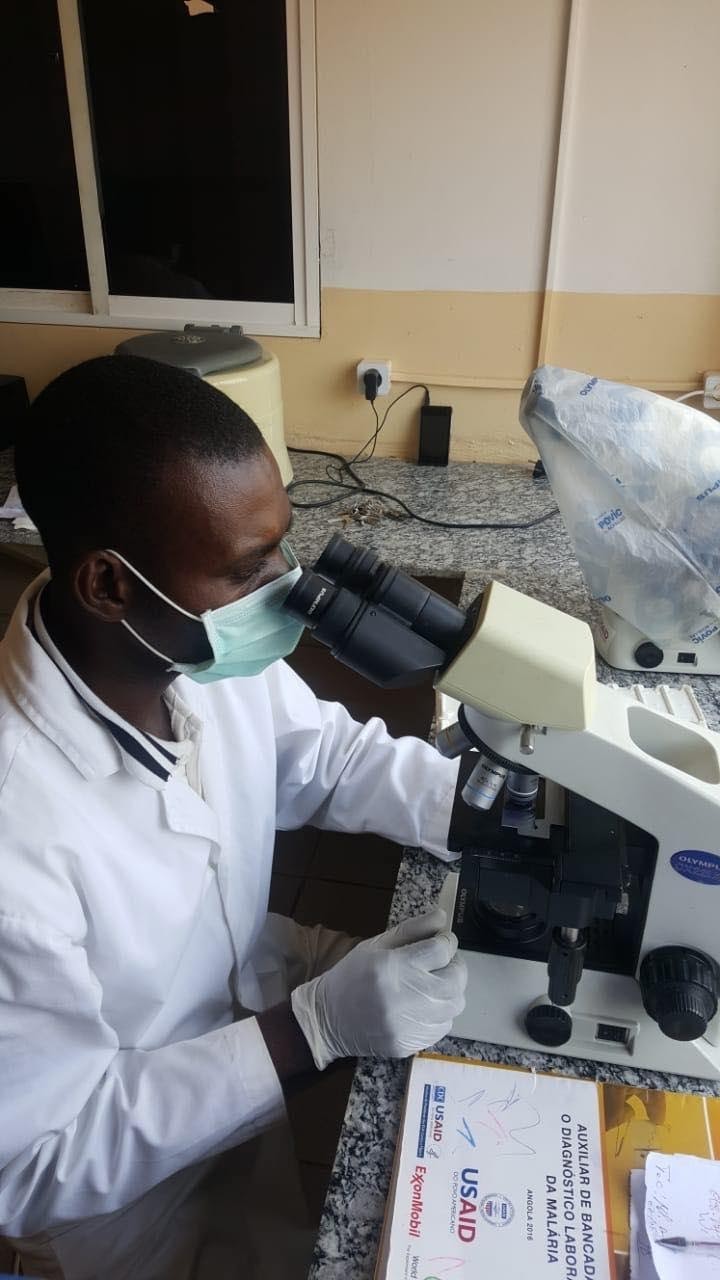Speeches Shim

In the last two years, USAID has capacitated 308 lab technicians in six Angola provinces.
“The Health for All project from USAID/PMI has been a school that is helping us improve our technical skills.” Mateus Caxilo, Laboratory of Clinical Analysis, Uige
Diagnosing malaria in a timely manner remains a significant challenge in Angola. According to the Plano Nacional de Desenvolvimento Sanitário 2013-2025, only 45% of the Angolan population have access to health units. Of these units, less than 40% have laboratory capacity—and those with capacity are often poor quality. To effectively combat malaria and save lives, it is essential to increase malaria diagnosis coverage and the diagnosis capacity of existing laboratories.
USAID through its Health for All project funded by the President’s Malaria Initiative (PMI) and in partnership with Centers for Disease Control and Prevention, supports the National Malaria Control Program with an objective to strengthen the technical capacity of laboratory technicians for malaria diagnosis through optic microscopy. Microscopy, the gold standard for malaria diagnosis, and rapid diagnostic tests are the two diagnostic tools for malaria in Angola. HFA works with health units in targeted provinces around Angola to build capacity by providing on-the-job training, formative supervision, and mentoring laboratory technicians.
Mateus Caxilo from Uige province, is a supervisor to five lab technicians at the Laboratory of Clinical Analysis at Songo Municipal Hospital. He participated in three HFA Laboratory Diagnosis training, most recently conducted in March 2020 and one example of how the project interventions have had a positive impact in his daily work.
During the training he highlighted the importance of the USAID/HFA project in continuing to provide efforts to strengthen laboratory capacity by conducting training and providing supportive supervision which he considers to be “a school that is helping us improve our technical skills.” Regular turnover of health providers is a challenge Mr. Caxilo highlighted. He said that the supportive supervision provided by HFA helps minimize turnover.
“My colleagues are new to malaria and were never trained before. Training offered to supervisors after being hired last October has assisted them to better understand malaria laboratory diagnosis. I noticed changes in my colleagues when counting and interpreting results. I have been helping by passing down my skills to other lab technicians he supervises, but that was not enough. The training offered by USAID/HFA really helped them expand their skills and techniques as professional lab technicians and I see a lot of improvement in my team.”
Since 2018, USAID/HFA has supported the training of 308 lab technicians in six provinces. Of the 308 trained technicians, 31% scored 75% or above on the post-test (75% is defined as a measure of success, acknowledging that the laboratory science is highly technical). HFA will continue to provide frontline workers with the knowledge, skills, and tools they need to effectively address public health needs, including timely diagnosis of malaria.
“The Health for All project from USAID/PMI has been a school that is helping us improve our technical skills.”
Mateus Caxilo,
Laboratory of Clinical Analysis, Uige

Comment
Make a general inquiry or suggest an improvement.